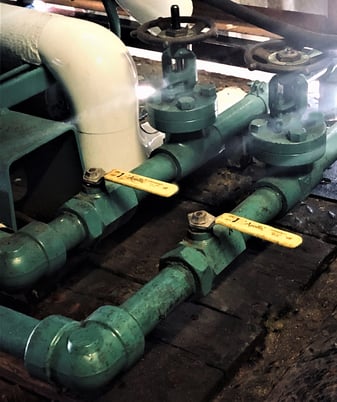Boilers are often compared to cars. Just as all types of cars and trucks require tunes ups, commercial and industrial boilers also need to be maintained.
Think about the steps you take to maintain your car: regular oil changes, rotating the tires and checking that the radiator has plenty of coolant. As a driver, tending to your vehicle provides a better and safer driving experience and helps you get the most out of your vehicle.
So the question is, why wouldn’t you do the same for a boiler?
Both boilers and cars have numerous moving parts and over time those parts need to be adjusted or replaced. Proper maintenance ensures your boiler (and car!) is running at peak efficiency.

One way to increase the life expectancy of your steam boiler is to keep its water within the appropriate parameters necessary, as guided by your service vendor. The water within a boiler is very similar to the oil in a car engine; it is required for the equipment to safely perform its duties. If the water in a boiler is not being routinely refreshed, the impurities in the water from constant steam production can become hazardous to the boiler by causing scale.
Scale sits on the tubes (where it exchanges heat), which lessens the ability to transfer thermal energy into steam. This decreases the efficiency of your boiler but can also cause corrosion of the boiler components. When oxidization occurs, it can eventually lead to more serious issues over time. Corrosion may cause the tubes to fail, which ultimately results in overall boiler failure.
The method used to remove the water impurities within a boiler is called blowdown. Blowing down a boiler consists of manually opening designated valves at the front, rear, sides and near the top of the boiler to drain the potentially poor water. If the water in the boiler sits for too long, the minerals will begin to settle on the bottom of the boiler or the tubes (depending on the model of the boiler).
Blowing down your boiler only takes a few moments but it helps your system last longer and operate more efficiently. Please note that each valve should be manually opened one at a time and for no more than 3-5 seconds. Too much blowdown will lead to a very dangerous “low water” condition in a hot boiler.
A common misconception is that boiler blowdown is not required if you are using proper water treatment. This is not the case and you should always blowdown your boiler regardless of the appropriate chemicals that are used. Water treatment chemicals are very important, but they are not 100% effective unless you are blowing it down.
To learn more about steam boiler blowdown, or to schedule a maintenance appointment, contact Wilkinson at (800) 777-1629.

